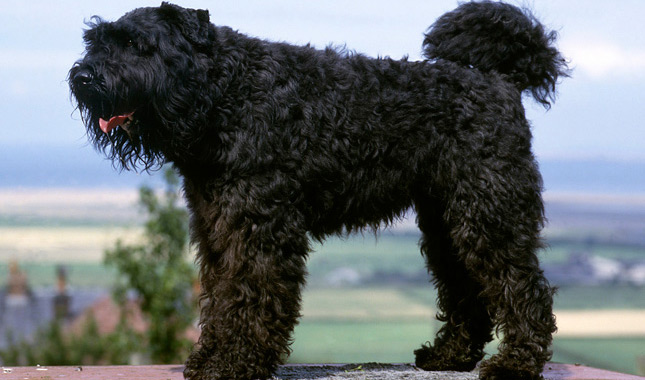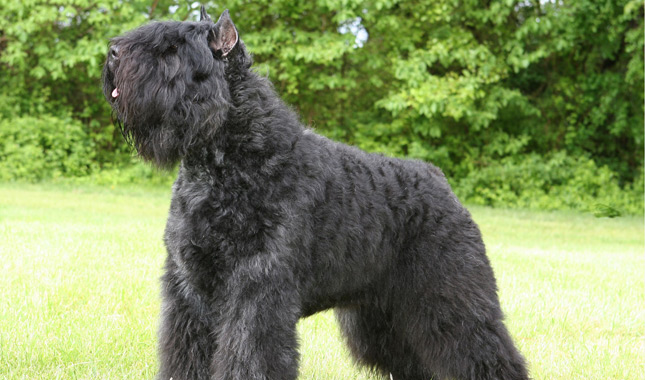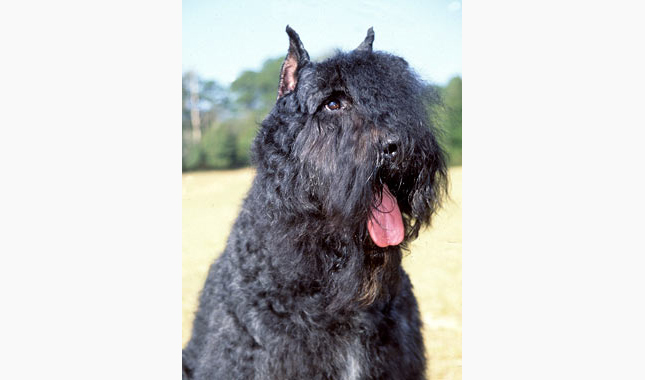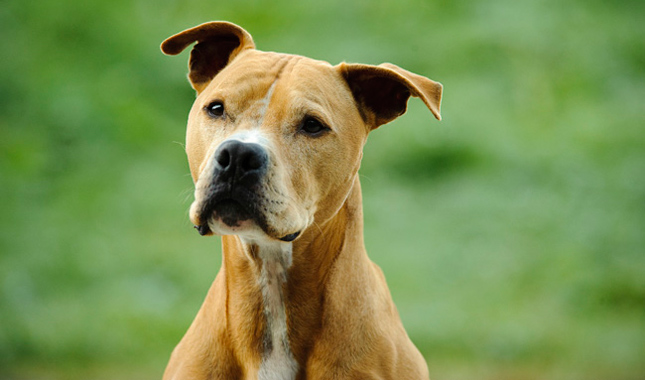Bouvier des Flandres
Published on July 19, 2011
Skip To
Breed Details
- Height: 23.5 to 27.5 inches at the shoulder
- Weight: 70 to 110 pounds
Breed Characteristics
Adaptability
Trainability
Grooming
Apartament Friendly
Child Friendly
Shedding Level
Dog Friendly
Exercise Needs
Territorial
Barking Tendencies
Health Issues
Social Needs
Energy Level
Affectionate
Watchdog Instincts
Cat Friendly
Intelligence
Stranger Friendly
Thanks to his bushy eyebrows, walrus-like mustache, and full beard, the Bouvier des Flandres sports a truly unique look. This highly protective herding dog is also full of smarts and independence — and he’s happiest when he has a job to do. The breed’s caveat: his coat gets dirty easily, and it takes time and patience to groom him.
The Bouvier des Flandres was created in Belgium as a multipurpose farm dog who could drive cattle, pull carts, and serve as a watchdog. He’s still capable of all these tasks, but nowadays, the Bouvier is primarily a family companion or a show dog best suited to suburban life.
Like most dogs with a working background, the intelligent Bouvier is an independent thinker, so he must be taught from an early age that you are his leader. It’s also important to assign him daily “work,” such as helping to pull garden tools around the yard or participating in dog sports, like agility, carting, herding, and tracking. Bouviers are active and athletic, so they enjoy jogging, hiking, and long walks (at least 20 minutes) twice a day. If you’re the outdoorsy type, look into search-and-rescue training for you and your Bouvier.
If you prize a clean home, a Bouvier is probably not the best breed match: His beard will drip after he drinks, and you’ll need to clean it after every meal. His rough coat also attracts plenty of dirt and debris. And the Bouvier is known for flatulence, so you’ll frequently pick up an unpleasant odor wafting through the house.
A Bouvier should be serene, yet still have strong guarding instincts. Of course, there’s a difference between protectiveness and hostility — a Bouvier should never be aggressive. He should be able to discriminate between situations that call for action and those that do not, which is why early socialization is essential to keep a Bouvier from becoming overly suspicious or fearful of anything new. Although the Bouvier can be stubborn, he learns quickly and will respond well to kind, firm, and consistent training accompanied by lavish praise. He’s smart and can lose interest in mundane training easily, so aim for short and engaging sessions.
The agile Bouvier requires a home with a large yard surrounded by a solid fence that’s at least 5 feet high. Don’t bother with an underground electronic fence — the shock it emits doesn’t deter this tough dog. Bouviers have a high prey drive and will chase other animals, but if they’re raised with other pets, such as indoor cats, they can learn to live peaceably with them. Ultimately, Bouviers are guardian dogs who are fiercely devoted to their people. In other words, when his family is at home, he should be, too.
World War I nearly put an end to the breed — only a few dogs survived the war — but a dedicated group of breeders managed to replenish Bouvier numbers. The American Kennel Club recognized the Bouvier in 1929, and a number of Bouviers were imported to the United States in the decade that followed. In 1963, the American Bouvier des Flandres Club was formed. Today, the breed ranks 85th among the dogs registered by the AKC.
This is a smart dog who learns quickly, but he has a mind of his own. It takes an even smarter person, with plenty of patience, to train him. Bouviers adore praise for a job well done, but once they’ve learned a command or a task, they’re ready to move on to the next one — and they can stubbornly refuse to repeat an action one too many times.
Start training your puppy the day you bring him home. Even at eight weeks old, he is capable of soaking up everything you can teach him. Don’t wait until he is 6 months old to begin training or you will have a more headstrong dog to deal with. If possible, get him into puppy kindergarten class by the time he is 10 to 12 weeks old, and socialize, socialize, socialize. However, be aware that many puppy training classes require certain vaccines (like kennel cough) to be up to date, and many veterinarians recommend limited exposure to other dogs and public places until puppy vaccines (including rabies, distemper and parvovirus) have been completed. In lieu of formal training, you can begin training your puppy at home and socializing him among family and friends until puppy vaccines are completed.
The Bouvier is also at risk for bloat, a condition in which the stomach expands with air. This can become the more serious condition, gastric volulus, if the stomach twists, cutting off blood flow. Gastric torsion, also known as gastric dilatation volvulus, strikes suddenly — a dog who is fine one minute can die within a few hours. Watch for the following symptoms: restlessness and pacing, drooling, pale gums, lip licking, dry vomiting, and signs of pain. Gastric torsion requires immediate surgery, and most dogs will bloat again. It’s wise to opt for a procedure known as stomach tacking, which prevents the stomach from twisting in the future. It can also be performed as a preventive measure.
Veterinarians can’t predict if an animal will be free of these maladies, so it’s important to find a reputable breeder and insist upon seeing independent certification that the parents of the dog have been screened for defects and deemed healthy. The American Bouvier des Flandres Club (ABdFC) participates in the Canine Health Information Center (CHIC), a health database. For Bouviers to achieve CHICcertification, breeders must submit hip, elbow, and heart evaluations from the Orthopedic Foundation for Animals (OFA), as well as eye clearances from the Canine Eye Registration Foundation (CERF). (The minimum age for the eye exam is 18 months.) The ABdFC recommends that CERF exams be repeated every two years, until the dog is 8 years old. And although it is not required, potential owners should also ask for an OFA thyroid evaluation. Breeders must agree to have all test results, positive or negative, published in the database, which can be accessed by anyone who wants to check the health of a puppy’s parents.
Careful breeders screen their dogs for genetic disease, and only breed the best-looking specimens, but sometimes Mother Nature has other ideas and a puppy can develop one of these conditions. In most cases, he can still live a good life, thanks to advances in veterinary medicine. And remember that you have the power to protect your Bouvier from one of the most common health problems: obesity. Keeping him at an appropriate weight is a simple way to extend your Bouvier’s life.
If you adore the way Bouviers look in the show ring, think twice about getting the breed: This well-coiffed look takes hours to achieve. At home, the Bouvier is your typical shaggy dog. His coat doesn’t shed much, but it does develop mats and tangles if not thoroughly brushed once a week. A good brushing takes about an hour; ask your breeder or a groomer to show you how to line brush the coat, so you don’t miss any mats. You’ll need a stiff bristle or pin brush, as well as blunt-tipped scissors. If you don’t plan to show him, it’s okay to trim the Bouvier’s beard and coat for easier upkeep. The rest is routine care: bath your Bouvier when he’s dirty, as well as clean his ears and trim his nails on a regular basis.
Lots of breeders have websites, so how can you tell who’s good and who’s not? Red flags to look out for: multiple litters on the premises, puppies always being available, having your choice of any puppy, and being offered the option to pay online with a credit card. Breeders who sell puppies at a lower price “without papers” are unethical and should be reported to the American Kennel Club. You should also bear in mind that buying a puppy from websites that offer to ship your dog to you immediately can be a risky venture, as it leaves you no recourse if what you get isn’t exactly what you expected. Put at least as much effort into researching your puppy as you would into choosing a new car or expensive appliance. It will save you money in the long run.
To start your search, check out the website of the American Bouvier des Flandres Club and choose a breeder who has agreed to abide by the ABdFC’s code of ethics, which specifies that members not place puppies prior to 12 weeks of age, prohibits the sale of puppies through pet stores, and calls for the breeder to obtain recommended health clearances before breeding.
Whether you’re planning to get your new best friend from a breeder, a pet store, or another source, don’t forget that old adage “let the buyer beware”. Disreputable breeders and facilities that deal with puppy mills can be hard to distinguish from reliable operations. There’s no 100% guaranteed way to make sure you’ll never purchase a sick puppy, but researching the breed (so you know what to expect), checking out the facility (to identify unhealthy conditions or sick animals), and asking the right questions can reduce the chances of heading into a disastrous situation. And don’t forget to ask your veterinarian, who can often refer you to a reputable breeder, breed rescue organization, or other reliable source for healthy puppies.
The cost of a Bouvier des Flandres puppy varies depending on the breeder’s locale, the sex of the puppy, the titles that the puppy’s parents have (working titles are preferable to prove they are good specimens of the breed), and whether the puppy is best suited for the show ring or a pet home. Puppies should be temperament tested, vetted, dewormed, and socialized to give them a healthy, confident start in life. If you put as much effort into researching your puppy as you would when buying a new car, it will save you money in the long run.
Before you decide to buy a puppy, consider whether an adult Bouvier may better suit your lifestyle. Puppies are loads of fun, but they require a good deal of time and effort before they grow up to be the dog of your dreams. An adult may already have some training, and he’ll probably be less active, destructive, and demanding than a puppy. With an adult, you know more about what you’re getting in terms of personality and health and you can find adults through breeders or shelters. If you are interested in acquiring an older dog through breeders, ask them about purchasing a retired show dog or if they know of an adult dog who needs a new home. If you want to adopt a dog, read the advice below on how to do that.
1. Use the Web
Sites like Petfinder.com and Adopt-a-Pet.com can have you searching for a Bouvier in your area in no time flat. The site allows you to be very specific in your requests (housetraining status, for example) or very general (all the Bouviers available on Petfinder across the country). AnimalShelter can help you find animal rescue groups in your area. Also some local newspapers have “pets looking for homes” sections you can review.
Social media is another great way to find a dog. Post on your Facebook page that you are looking for a specific breed so that your entire community can be your eyes and ears.
2. Reach Out to Local Experts
Start talking with all the pet pros in your area about your desire for a Bouvier. That includes vets, dog walkers, and groomers. When someone has to make the tough decision to give up a dog, that person will often ask her own trusted network for recommendations.
3. Talk to Breed Rescue
Most people who love Bouvier des Flandres love all Bouvier des Flandres. That’s why breed clubs have rescue organizations devoted to taking care of homeless dogs. The Bouvier des Flandres Club of America’s rescue group can help locate the perfect companion for your family. You can also search for other Bouvier des Flandres rescues in your area through AnimalShelter.
The great thing about breed rescue groups is that they tend to be very upfront about any health conditions the dogs may have and are a valuable resource for advice. They also often offer fostering opportunities so, with training, you could bring a Bouvier home with you to see what the experience is like.
4. Key Questions to Ask
You now know the things to discuss with a breeder, but there are also questions you should discuss with shelter or rescue-group staff or volunteers before you bring home a dog:
What is his energy level?
How is he around other animals?
How does he respond to shelter workers, visitors and children?
What is his personality like?
What is his age?
Is he housetrained?
Has he ever bitten or hurt anyone that they know of?
Are there any known health issues?
Wherever you acquire your Bouvier, make sure you have a good contract with the seller, shelter or rescue group that spells out responsibilities on both sides. Petfinder offers an Adopters Bill of Rights that helps you understand what you can consider normal and appropriate when you get a dog from a shelter. In states with “puppy lemon laws,” be sure you and the person you get the dog from both understand your rights and recourses.
Puppy or adult, take your Bouvier to your veterinarian soon after adoption. Your veterinarian will be able to spot problems, and will work with you to set up a preventive regimen that will help you avoid many health issues.
Like most dogs with a working background, the intelligent Bouvier is an independent thinker, so he must be taught from an early age that you are his leader. It’s also important to assign him daily “work,” such as helping to pull garden tools around the yard or participating in dog sports, like agility, carting, herding, and tracking. Bouviers are active and athletic, so they enjoy jogging, hiking, and long walks (at least 20 minutes) twice a day. If you’re the outdoorsy type, look into search-and-rescue training for you and your Bouvier.
If you prize a clean home, a Bouvier is probably not the best breed match: His beard will drip after he drinks, and you’ll need to clean it after every meal. His rough coat also attracts plenty of dirt and debris. And the Bouvier is known for flatulence, so you’ll frequently pick up an unpleasant odor wafting through the house.
A Bouvier should be serene, yet still have strong guarding instincts. Of course, there’s a difference between protectiveness and hostility — a Bouvier should never be aggressive. He should be able to discriminate between situations that call for action and those that do not, which is why early socialization is essential to keep a Bouvier from becoming overly suspicious or fearful of anything new. Although the Bouvier can be stubborn, he learns quickly and will respond well to kind, firm, and consistent training accompanied by lavish praise. He’s smart and can lose interest in mundane training easily, so aim for short and engaging sessions.
The agile Bouvier requires a home with a large yard surrounded by a solid fence that’s at least 5 feet high. Don’t bother with an underground electronic fence — the shock it emits doesn’t deter this tough dog. Bouviers have a high prey drive and will chase other animals, but if they’re raised with other pets, such as indoor cats, they can learn to live peaceably with them. Ultimately, Bouviers are guardian dogs who are fiercely devoted to their people. In other words, when his family is at home, he should be, too.
Other Quick Facts
- The Bouvier’s coat comes in several colors, ranging from fawn to black. You may also see brindle and salt-and-pepper coats. A small star on the chest is the only white allowed.
- Bouviers have had roles in movies, including Town and Country and A Dog of Flanders, a film about a boy and his beloved Bouvier.
The History of the Bouvier des Flandres
The Bouvier was bred as a farm dog in Flanders, an area located in present day Belgium. He drove cattle to market and worked as a butcher’s dog, often pulling a cart. In 1910, the homely dog was recognized as a specific breed at the International Dog Show in Brussels. During a meeting of Bouvier breeders in 1912, a breed standard was formally written.World War I nearly put an end to the breed — only a few dogs survived the war — but a dedicated group of breeders managed to replenish Bouvier numbers. The American Kennel Club recognized the Bouvier in 1929, and a number of Bouviers were imported to the United States in the decade that followed. In 1963, the American Bouvier des Flandres Club was formed. Today, the breed ranks 85th among the dogs registered by the AKC.
Bouvier des Flandres Temperament and Personality
The breed standard calls for the Bouvier to be calm, steady, resolute, and fearless. Bouviers love people and make good family dogs, but they should be supervised around small children. Since the Bouvier is a working breed, he enjoys completing tasks, such as fetching items around the house, tagging along as a running or bicycling partner, and participating in dog sports.This is a smart dog who learns quickly, but he has a mind of his own. It takes an even smarter person, with plenty of patience, to train him. Bouviers adore praise for a job well done, but once they’ve learned a command or a task, they’re ready to move on to the next one — and they can stubbornly refuse to repeat an action one too many times.
Start training your puppy the day you bring him home. Even at eight weeks old, he is capable of soaking up everything you can teach him. Don’t wait until he is 6 months old to begin training or you will have a more headstrong dog to deal with. If possible, get him into puppy kindergarten class by the time he is 10 to 12 weeks old, and socialize, socialize, socialize. However, be aware that many puppy training classes require certain vaccines (like kennel cough) to be up to date, and many veterinarians recommend limited exposure to other dogs and public places until puppy vaccines (including rabies, distemper and parvovirus) have been completed. In lieu of formal training, you can begin training your puppy at home and socializing him among family and friends until puppy vaccines are completed.
What You Need To Know About Bouvier des Flandres Health
Bouviers are susceptible to several health problems, including hip dysplasia, glaucoma, a heart condition called subaortic stenosis, cancer, laryngeal paralysis and hypothyroidism.The Bouvier is also at risk for bloat, a condition in which the stomach expands with air. This can become the more serious condition, gastric volulus, if the stomach twists, cutting off blood flow. Gastric torsion, also known as gastric dilatation volvulus, strikes suddenly — a dog who is fine one minute can die within a few hours. Watch for the following symptoms: restlessness and pacing, drooling, pale gums, lip licking, dry vomiting, and signs of pain. Gastric torsion requires immediate surgery, and most dogs will bloat again. It’s wise to opt for a procedure known as stomach tacking, which prevents the stomach from twisting in the future. It can also be performed as a preventive measure.
Veterinarians can’t predict if an animal will be free of these maladies, so it’s important to find a reputable breeder and insist upon seeing independent certification that the parents of the dog have been screened for defects and deemed healthy. The American Bouvier des Flandres Club (ABdFC) participates in the Canine Health Information Center (CHIC), a health database. For Bouviers to achieve CHICcertification, breeders must submit hip, elbow, and heart evaluations from the Orthopedic Foundation for Animals (OFA), as well as eye clearances from the Canine Eye Registration Foundation (CERF). (The minimum age for the eye exam is 18 months.) The ABdFC recommends that CERF exams be repeated every two years, until the dog is 8 years old. And although it is not required, potential owners should also ask for an OFA thyroid evaluation. Breeders must agree to have all test results, positive or negative, published in the database, which can be accessed by anyone who wants to check the health of a puppy’s parents.
Careful breeders screen their dogs for genetic disease, and only breed the best-looking specimens, but sometimes Mother Nature has other ideas and a puppy can develop one of these conditions. In most cases, he can still live a good life, thanks to advances in veterinary medicine. And remember that you have the power to protect your Bouvier from one of the most common health problems: obesity. Keeping him at an appropriate weight is a simple way to extend your Bouvier’s life.
The Basics of Bouvier des Flandres Grooming
The Bouvier has a double coat, with a tousled look. His undercoat, which offers warmth and water-resistance, is soft, dense, and topped by rough hairs that protect the dog from inclement weather. A mustache, beard, and eyebrows give the Bouvier his characteristic gruff appearance.If you adore the way Bouviers look in the show ring, think twice about getting the breed: This well-coiffed look takes hours to achieve. At home, the Bouvier is your typical shaggy dog. His coat doesn’t shed much, but it does develop mats and tangles if not thoroughly brushed once a week. A good brushing takes about an hour; ask your breeder or a groomer to show you how to line brush the coat, so you don’t miss any mats. You’ll need a stiff bristle or pin brush, as well as blunt-tipped scissors. If you don’t plan to show him, it’s okay to trim the Bouvier’s beard and coat for easier upkeep. The rest is routine care: bath your Bouvier when he’s dirty, as well as clean his ears and trim his nails on a regular basis.
Finding a Bouvier des Flandres
Whether you want to go with a breeder or get your dog from a shelter or rescue, here are some things to keep in mind.Choosing a Bouvier des Flandres Breeder
Selecting a respected breeder is the key to finding the right puppy. Reputable breeders will welcome questions about temperament and health clearances, as well as explain the history of the breed and what kind of puppy makes for a good pet. Don’t be shy about describing exactly what you’re looking for in a dog — breeders interact with their puppies daily and can make accurate recommendations once they know something about your lifestyle and personality.Lots of breeders have websites, so how can you tell who’s good and who’s not? Red flags to look out for: multiple litters on the premises, puppies always being available, having your choice of any puppy, and being offered the option to pay online with a credit card. Breeders who sell puppies at a lower price “without papers” are unethical and should be reported to the American Kennel Club. You should also bear in mind that buying a puppy from websites that offer to ship your dog to you immediately can be a risky venture, as it leaves you no recourse if what you get isn’t exactly what you expected. Put at least as much effort into researching your puppy as you would into choosing a new car or expensive appliance. It will save you money in the long run.
To start your search, check out the website of the American Bouvier des Flandres Club and choose a breeder who has agreed to abide by the ABdFC’s code of ethics, which specifies that members not place puppies prior to 12 weeks of age, prohibits the sale of puppies through pet stores, and calls for the breeder to obtain recommended health clearances before breeding.
Whether you’re planning to get your new best friend from a breeder, a pet store, or another source, don’t forget that old adage “let the buyer beware”. Disreputable breeders and facilities that deal with puppy mills can be hard to distinguish from reliable operations. There’s no 100% guaranteed way to make sure you’ll never purchase a sick puppy, but researching the breed (so you know what to expect), checking out the facility (to identify unhealthy conditions or sick animals), and asking the right questions can reduce the chances of heading into a disastrous situation. And don’t forget to ask your veterinarian, who can often refer you to a reputable breeder, breed rescue organization, or other reliable source for healthy puppies.
The cost of a Bouvier des Flandres puppy varies depending on the breeder’s locale, the sex of the puppy, the titles that the puppy’s parents have (working titles are preferable to prove they are good specimens of the breed), and whether the puppy is best suited for the show ring or a pet home. Puppies should be temperament tested, vetted, dewormed, and socialized to give them a healthy, confident start in life. If you put as much effort into researching your puppy as you would when buying a new car, it will save you money in the long run.
Before you decide to buy a puppy, consider whether an adult Bouvier may better suit your lifestyle. Puppies are loads of fun, but they require a good deal of time and effort before they grow up to be the dog of your dreams. An adult may already have some training, and he’ll probably be less active, destructive, and demanding than a puppy. With an adult, you know more about what you’re getting in terms of personality and health and you can find adults through breeders or shelters. If you are interested in acquiring an older dog through breeders, ask them about purchasing a retired show dog or if they know of an adult dog who needs a new home. If you want to adopt a dog, read the advice below on how to do that.
Adopting a Dog From a Bouvier des Flandres Rescue or Shelter
There are many great options available if you want to adopt a dog from an animal shelter or breed rescue organization. Here is how to get started.1. Use the Web
Sites like Petfinder.com and Adopt-a-Pet.com can have you searching for a Bouvier in your area in no time flat. The site allows you to be very specific in your requests (housetraining status, for example) or very general (all the Bouviers available on Petfinder across the country). AnimalShelter can help you find animal rescue groups in your area. Also some local newspapers have “pets looking for homes” sections you can review.
Social media is another great way to find a dog. Post on your Facebook page that you are looking for a specific breed so that your entire community can be your eyes and ears.
2. Reach Out to Local Experts
Start talking with all the pet pros in your area about your desire for a Bouvier. That includes vets, dog walkers, and groomers. When someone has to make the tough decision to give up a dog, that person will often ask her own trusted network for recommendations.
3. Talk to Breed Rescue
Most people who love Bouvier des Flandres love all Bouvier des Flandres. That’s why breed clubs have rescue organizations devoted to taking care of homeless dogs. The Bouvier des Flandres Club of America’s rescue group can help locate the perfect companion for your family. You can also search for other Bouvier des Flandres rescues in your area through AnimalShelter.
The great thing about breed rescue groups is that they tend to be very upfront about any health conditions the dogs may have and are a valuable resource for advice. They also often offer fostering opportunities so, with training, you could bring a Bouvier home with you to see what the experience is like.
4. Key Questions to Ask
You now know the things to discuss with a breeder, but there are also questions you should discuss with shelter or rescue-group staff or volunteers before you bring home a dog:
What is his energy level?
How is he around other animals?
How does he respond to shelter workers, visitors and children?
What is his personality like?
What is his age?
Is he housetrained?
Has he ever bitten or hurt anyone that they know of?
Are there any known health issues?
Wherever you acquire your Bouvier, make sure you have a good contract with the seller, shelter or rescue group that spells out responsibilities on both sides. Petfinder offers an Adopters Bill of Rights that helps you understand what you can consider normal and appropriate when you get a dog from a shelter. In states with “puppy lemon laws,” be sure you and the person you get the dog from both understand your rights and recourses.
Puppy or adult, take your Bouvier to your veterinarian soon after adoption. Your veterinarian will be able to spot problems, and will work with you to set up a preventive regimen that will help you avoid many health issues.












